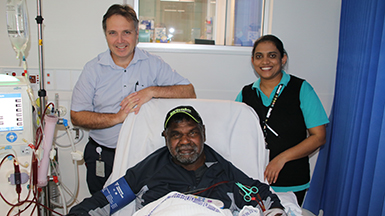Robert’s self-motivation for better health, one step at a time

Clinical Nurse Brett Cooper and Registered Nurse Neetu Thakkar at the Renal Department at RBWH with patient Robert Jacobs who suffered a life changing stroke at 45 years of age.
When Robert Jacobs woke up in hospital after suffering a stroke, he couldn’t move his body, but could faintly hear the doctor asking ‘if you can hear me, please blink’. All Robert could move was his eyes; every part of his body was paralysed.
Suffering a stroke at just 45 years old was a turning point in Robert’s life. He had to learn how to walk again, how to hold a cup, how to be himself again after such a dramatic change.
“You know I was a hard head growing up. I’ve always had high blood pressure and when my doctor warned me at a young age I could suffer a heart attack or stroke, I didn’t listen,” Robert said.
“I’ve had two strokes and a heart attack and now due to my kidney disease I will be on dialysis for the rest of my life.”
Robert, who is now 58, is a proud Wakka Wakka man from Cherbourg. He has fond memories of playing A grade football, boxing, swimming and running the 800 metres at school with ease.
“I was just like everyone else, fit and healthy. But I found myself trapped in my community, drinking and smoking with mates,” Robert said. “I only have myself to blame, if I took my blood pressure medication and listened to the doctor all those years ago, I wouldn’t be here today.”
Robert has been attending The Royal Brisbane and Women’s Hospital (RBWH) for over a year now, visiting the dialysis unit three days a week, for five hours each time to manage his kidney disease.
His condition has dramatically improved. He went from monthly visits with the doctor, to now only seeing him every six months. He has learned how to walk again and is attending the gym twice a week as part of the Institute for Urban Indigenous Health ‘Work it Out’ program.
“I went from being able to just take a few steps to the wall, now to being able to walk to my gym classes. I’ve progressed from my scooter, to walker and now a walking stick. I’ve improved a lot,” Robert said.
“I’ve also quit drinking and smoking since my stroke. Many of my old friends still continue to drink and smoke after a stroke, I tell them to look at me.”
Robert said the RBWH hospital staff and Indigenous liaison services had helped with his recovery.
“Visiting the RBWH has become a routine for me and we are all like family,” Robert said. “The nursing staff are good here. We have a good laugh and joke each time.”
